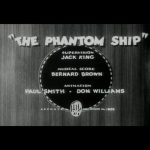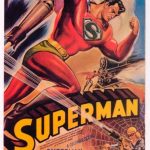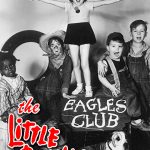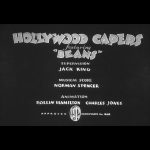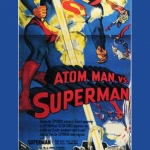-
Atom Man vs Superman (1950)
$15.00Serial – sequel to Superman (1948); Superman faces off against Lex Luthor.
-
The Phantom Ship (1936)
$25.00Uncle Beans and the kids are off to visit a haunted ship (‘The Phantom’) trapped in the ice, hoping to find pirate treasure. They encounter all manner of ghosts and goblins, but eventually find what they’ve been looking for. When Beans tries to warm up by throwing some chairs in a stove and lighting it, he thaws out a pair of pirates that chase the trio around. They treasure-seekers are eventually forced back into their plane and they decide to fly away.
-
Fishy Tales (1937)
$25.00By accident, Alfalfa shoots Butch in the nose with a rubber dart. Butch threatens to return to settle the score. Alfalfa, without success, feigns injury to avoid the fight
-
City Streets (1938)
$25.00When her mother dies, wheel-chair bound Winnie Brady is taken in by shopkeeper and neighbor “Uncle” Joe Carmine. Joe convinces Father Ryan to let him informally adopt her. Joe and Winnie live together with Tommy Devlin and his grandmother, Mrs. Devlin, and a dog Winnie names Muriel. Joe sells his shop to pay for an unsuccessful operation on Winnie’s legs. This bankrupts Carmine, who then earns a meager living selling fruits and vegetables on the streets. Winnie is sent to live in an orphanage, and Carmine is discouraged from continuing his relationship with her. Carmine is so distraught by grief that he slowly begins to die. Winnie is brought to him by Father Ryan, and she finds the strength to stand and walk to his bedside and sings his favorite song, “Santa Maria.” Later, after Winnie has acquired full use of her legs, Joe, in his new catering truck, takes the children on a picnic in the country.
-
Superman (1948)
$25.00Superman comes to Earth as a child and grows up to be his home’s first superhero with his first major challenge being to oppose The Spider Lady.
-
Our Gang
$48.00Our Gang is a series of American comedy short films about a group of poor neighborhood children and their adventures. Created by comedy producer Hal Roach, the series is noted for showing children behaving in a relatively natural way, as Roach and original director Robert F. McGowan worked to film the unaffected, raw nuances apparent in regular children rather than have them imitate adult acting styles.
In addition, Our Gang notably put boys, girls, whites and blacks together as equals, something that “broke new ground,” according to film historian Leonard Maltin. That had never been done before in cinema, but has since been repeated after the success of Our Gang.
The first production at the Roach studio in 1922 was a series of silent short subjects. When Roach changed distributors from Pathé to Metro-Goldwyn-Mayer in 1927, and converted the series to sound in 1929, the series took off. Production continued at the Roach studio until 1938, when the series was sold to MGM, continuing to produce the comedies until 1944. The Our Gang series includes 220 shorts and one feature film, General Spanky, featuring over forty-one child actors. As MGM retained the rights to the Our Gang trademark following their purchase of the production rights, the 80 Roach-produced “talkies” were syndicated for television under the title The Little Rascals beginning in 1955. Both Roach’s The Little Rascals package and MGM’s Our Gang package have since remained in syndication, with periodic new productions based on the shorts surfacing over the years, including a 1994 Little Rascals feature film released by Universal Pictures.
-
Hollywood Capers (1935)
$25.00W.C.Fields enters the Warmer Bros. Studio. Beans tries to drive in, but the guard throws him and his car against a tree. Charlie Chaplin drives in, followed by Oliver Hardy on foot – but we see that it’s really Beans in disguise. Oliver Owl is directing a picture; Beans sneaks onto the stage. He’s watching from a catwalk when someone knocks him off, into the middle of the scene. Beans is thrown off the set, right into the set of a Frankenstein movie. He accidentally brings the robotic monster to life, and it crashes into the original studio, eating the camera. Beans tries to stop the monster, but is sent flying. He lands against a wind machine. which chops up the monster.
-
Superman
$40.00Superman is a 15-part black-and-white Columbia film serial based on the comic book character Superman. It stars an uncredited Kirk Alyn and Noel Neill as Lois Lane. It is notable as the first live-action appearance of Superman on film and for the longevity of its distribution. The serial was directed by Thomas Carr, who later directed many early episodes of the Adventures of Superman television show, and Spencer Gordon Bennet, produced by Sam Katzman and shot in and around Los Angeles, California. It was originally screened at movie matinées and after the first three scene-setting chapters, every episode ends in a cliffhanger. The Superman-in-flight scenes are animations, in part due to the small production budget.
-
Atom Man vs. Superman
$8.00Atom Man vs. Superman, Columbia’s 43rd serial and the second live-action Superman screen appearance, both featuring Kirk Alyn as Superman, finds Lex Luthor, secretly the Atom Man, blackmailing the city of Metropolis by threatening to destroy the entire community. Perry White, editor of the Daily Planet, assigns Lois Lane, Jimmy Olsen and Clark Kent to cover the story.
- Home
- Pre-Order
- SALE
- Shop
- Action
- Adventure
- Animation
- Art
- Astrology & Space
- Biography
- Body & Mind
- Bollywood
- Comedy
- Crime
- Dance
- Documentary
- Drama
- Family
- Fantasy
- Fitness
- Food & Drink
- Foreign
- Garden & Home
- History
- Horror
- Kids
- Merchandise
- Movie & Theatre
- Musical
- Music
- Mystery
- Nature & Wildlife
- Religion
- Romance
- Science Fiction
- Soap
- Special Interest
- Sport
- Stand-Up
- Thriller
- Transport
- Travel & Places
- TV Movie
- War
- Western
- World
- Boxsets
- TV Series
- HD
- Top Rated
- Search
- Blog
- My Account







